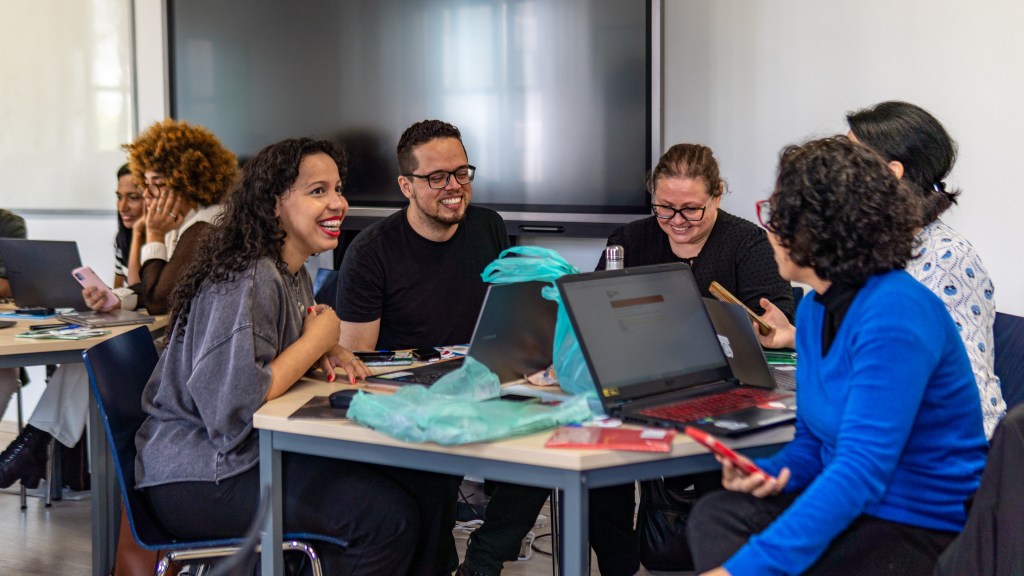
In 2024, the Wiki Movement Brazil User Group remains committed to the sharing of organizational learnings. As in the previous year, the organization’s professional team met in person in the middle of the year to, among other objectives, present and discuss the “case studies”: documents in which each management area documents the learnings and processes of the activities they promote. This initiative enhances the understanding of organizational activities, while also endorsing and fostering a culture of documentation and continuous reassessment of professional activities based on the lessons learned.
The in-person team meeting took place in the second half of July, in the city of São Paulo. This time, the meeting was held at the Goethe-Institut São Paulo headquarters, a building of historical significance that originally housed a monastery. In the 1980s, the nuns who lived there were relocated, and the building was eventually acquired by the German government to serve as the new site for the institute. In this pleasant setting for a four-day meeting, the agenda and objectives were expanded, focusing on five main points:
- Promoting team integration and identity;
- Providing an environment for ongoing operational training;
- Aligning WMB’s activities with the 2023-2025 strategic plan and the annual plan;
- Accelerating ongoing large-scale projects and initiatives; and
- Consolidating practices of mutual learning.
In the context of consolidating “mutual learning practices,” the aforementioned case studies were presented at a team-wide meeting and subsequently transformed into a published document. Each of the operational areas of Wiki Movimento Brasil delivered a presentation lasting about 15 minutes, followed by 5 minutes of open discussion for each case. Below is a list of each case study presented:
- Research on Member Admission in Mature Wikimedia Affiliates: a case study of research on member affiliation policies in mature Wikimedia affiliate organizations, initiated in April 2023 and published in February 2024.
- CALIBRA, Participant Engagement Process: a case study addressing the participant engagement process for Calibra, a program focused on developing and empowering Brazilian leaders for the Wikimedia Movement.
- Communication, Advocacy Campaign in Global Digital Governance Discussions: a case study on WMB’s communication strategy to highlight the organization’s stance and explore the communicative potential of two situations: the Open Letter to influence the Global Digital Compact and the collective declaration of NETmundial+10.
- Process for Developing the Report on Increasing the Use of Free Software and Platforms by WMB: a case study on the gradual yet consistent process of adopting free software and platforms in the management of WMB’s professional team.
- Technology, Technological Priorities of the Global South in Wikimedia: a case study on the Global South Technology Survey, aimed at identifying technological obstacles and improvements in tools, platforms, and processes that the Global South communities and their diasporas wish to see implemented to enhance user experience.
- Education, Survey on the Needs of Research Groups in Wikiversity: a case study on research concerning the use and needs of Research Groups with WikiEducation tools in Portuguese-language Wikiversity.
- Capacity Exchange, Participation of Capacity Exchange in the Outreachy Internship Program: a case study on the project within the 27th round of Outreachy, an international internship program in open-source and open-science projects.
- GLAM, Analysis and Licensing Guide for the Midiateca Capixaba: A case study on the project that led to the development of a guide capable of serving as a legal reference for Copyright Law, so that state institutions that comprise the Midiateca Capixaba can have their collections analyzed and made available under a free license.
- Fundraising, Partnerships Established with the Municipalities of Cachoeira and São Félix: a case study on the partnerships established with the public administration of the Brazilian municipalities of Cachoeira and São Félix, in the state of Bahia.
Thanks to an expanded agenda and objectives, the in-person meeting also included team-building activities and various elective workshops covering topics such as the digitization of collections, the organization of photo walks, as well as the creation of videos and design for social media. For the full list of all activities and workshops conducted during the four-day meeting, you can check the official event page. On the fourth and last day of the meeting, there was a work session in a Brazil – Chile Technical Learning Exchange Program, with the presence of Carla Toro, from Wikimedia Chile.
However, returning to the core of this Diff post, WMB’s commitment to the production and dissemination of the aforementioned case studies touches on several crucial aspects, the most significant of which is perhaps the pursuit of continuous improvement. Reporting on learnings and mistakes allows for learning from errors and making necessary improvements. Equally important, identifying and reporting on learnings and mistakes helps prevent their recurrence. By analyzing the root causes of errors, WMB can implement corrective measures and preventive strategies to avoid similar issues in the future.
Wiki Movimento Brasil would like to extend its gratitude to the Goethe-Institut São Paulo, especially Bethe Ferreira and Sven Mensing, for supporting the meeting at the institution ‘s headquarters.

Can you help us translate this article?
In order for this article to reach as many people as possible we would like your help. Can you translate this article to get the message out?
Start translation